|
S |
M |
T |
W |
T |
F |
S |
|
|
|
|
|
1
|
2
|
3
|
|
4
|
5
|
6
|
7
|
8
|
9
|
10
|
|
11
|
12
|
13
|
14
|
15
|
16
|
17
|
|
18
|
19
|
20
|
21
|
22
|
23
|
24
|
|
25
|
26
|
27
|
28
|
29
|
30
|
31
|
|
|
Forums10
Topics39,797
Posts565,763
Members14,620
| |
Most Online9,918
Jul 28th, 2025
|
|
|
|
Joined: Mar 2013
Posts: 2,862
Sidelock
|

Sidelock
Joined: Mar 2013
Posts: 2,862 |
I have several Spanish Sidelocks. They were made from the 1950s through the 1970s. Generally, the colors are still nice, but with some evidence of fading. I'd speculate it takes decades of handling, cleaning, and sun exposure for the colors to disappear. Consider what the average 100 year old Parker (or other Vintage gun) looks like now, the ones which have had lots of use.
I prefer wood to plastic, leather to nylon, waxed cotton to Gore-Tex, and split bamboo to graphite.
|
|
|
|
|
Joined: Feb 2011
Posts: 1,405
Sidelock
|

Sidelock
Joined: Feb 2011
Posts: 1,405 |
In photos of new guns from the period, colors look dull and drab. Black and white doesnt help though. Some ORIGINAL Parker Examples. Trojan 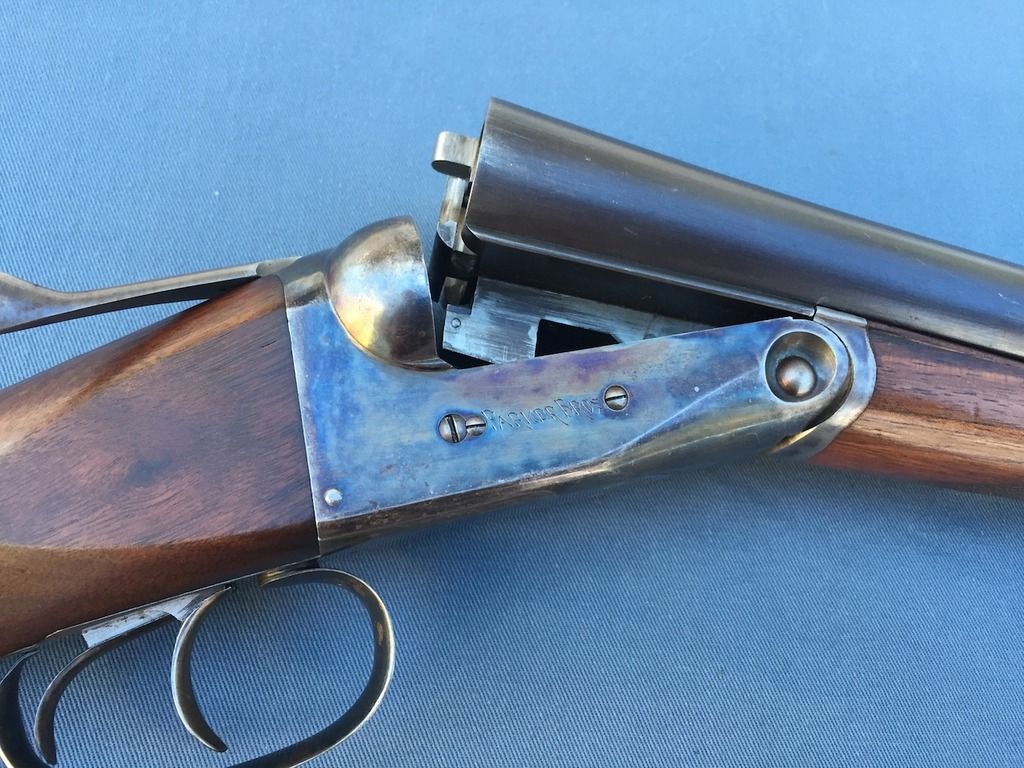 The Same Trojan 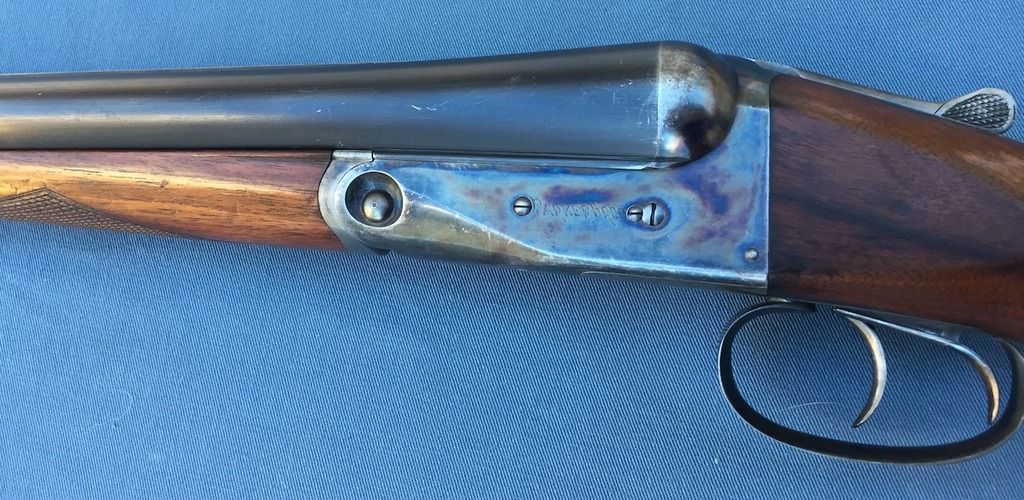 VH Grade 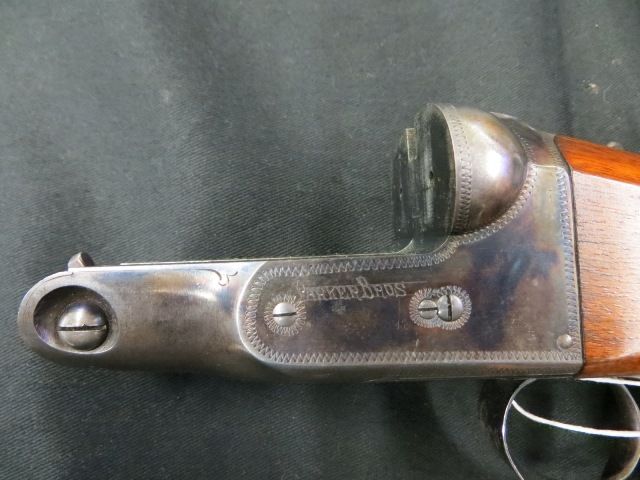 earlier PH Grade 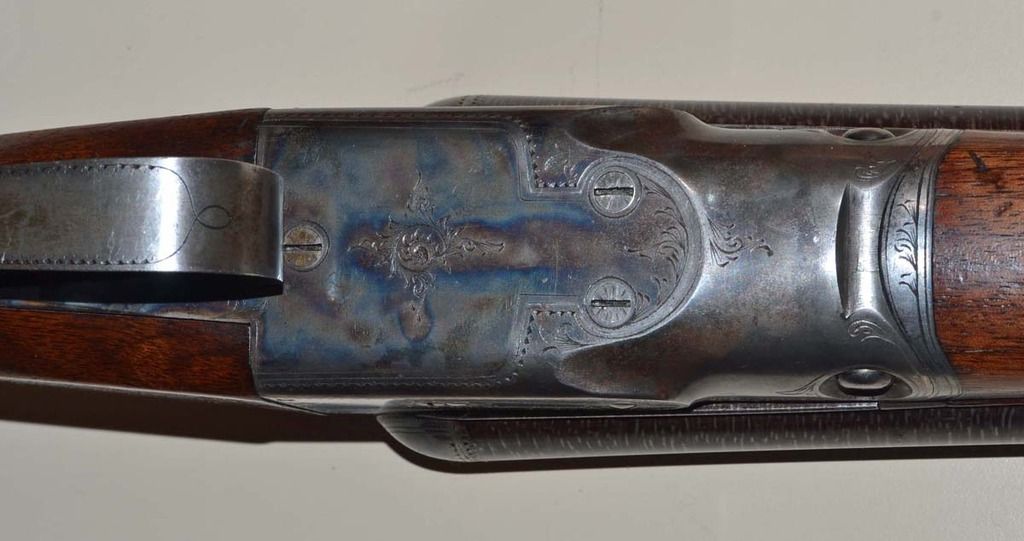
B.Dudley
|
|
|
|
|
Joined: Feb 2011
Posts: 1,405
Sidelock
|

Sidelock
Joined: Feb 2011
Posts: 1,405 |
And, in contrast, some RESTORED examples... Parker VHE. Restored colors and aged back to match condition of gun. 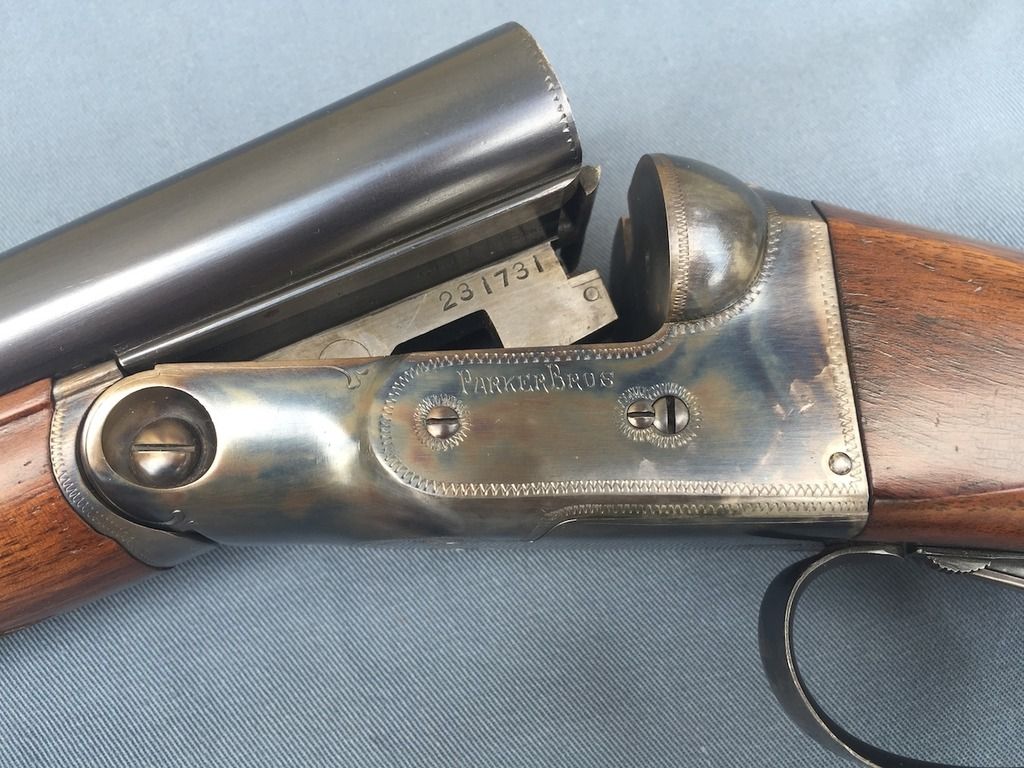 Same VHE Aged back colors. 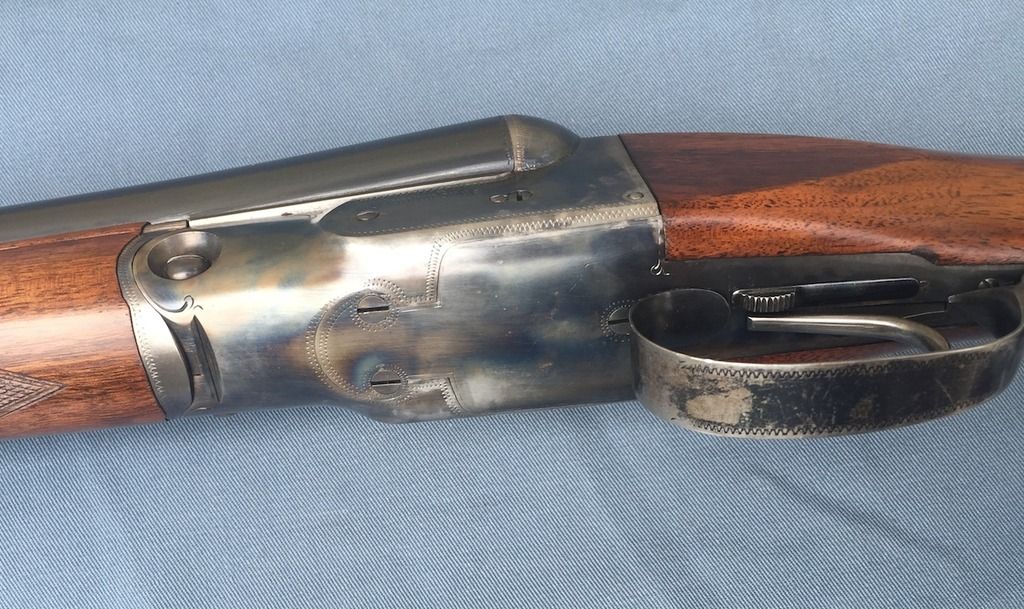 Parker CH Upgrade 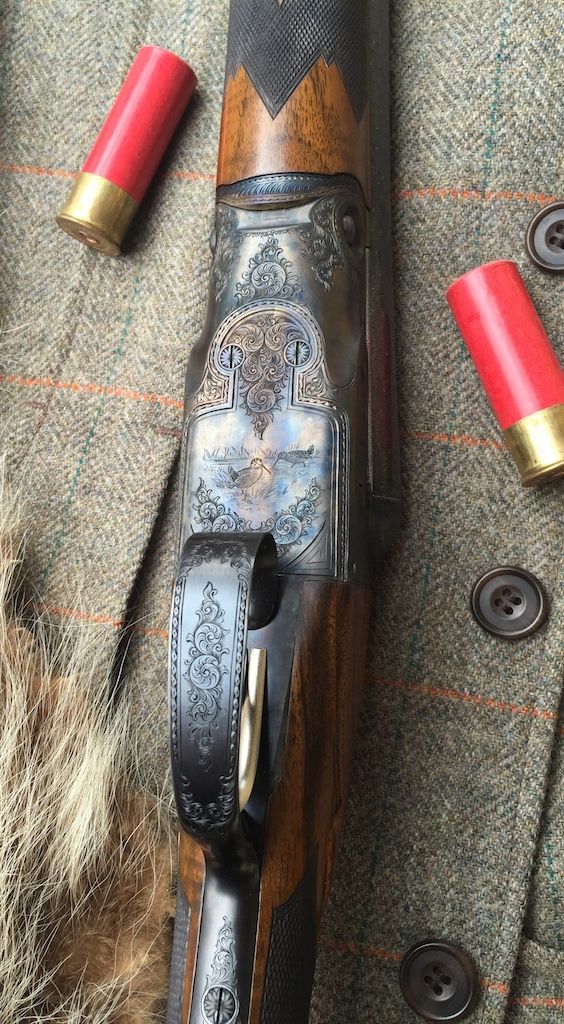 Parker VH 12g. Restored Colors. 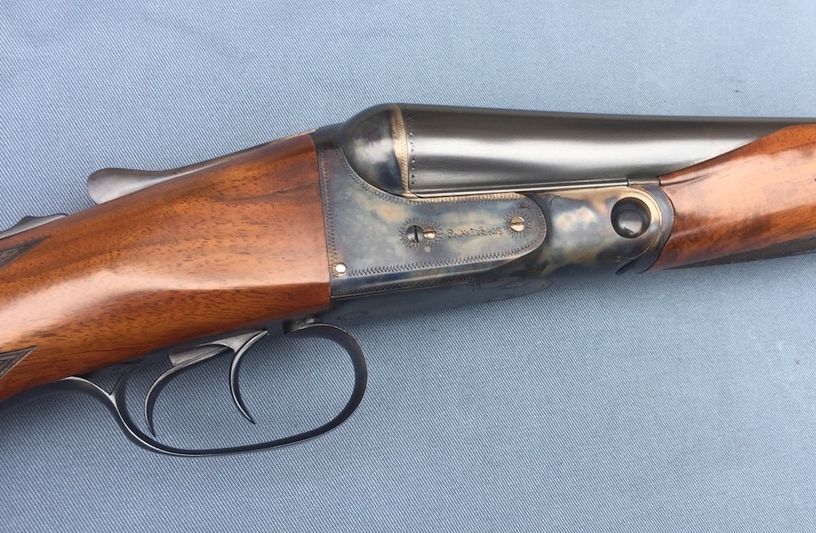 Parker VH 16g. Restored Colors. 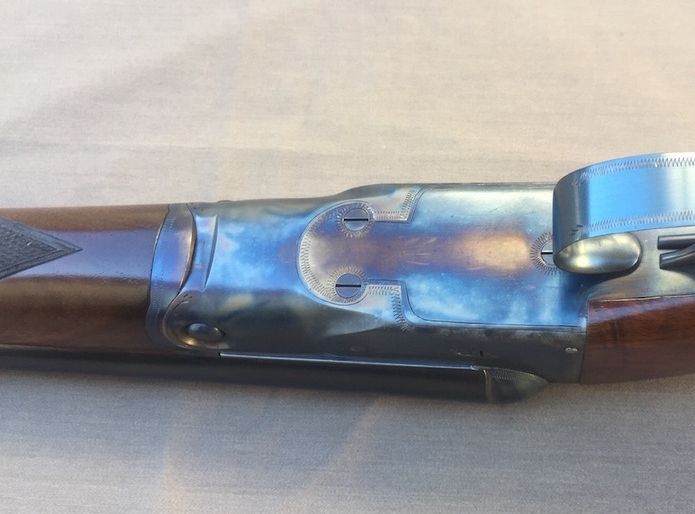 Parker PH 8g. Restored colors. 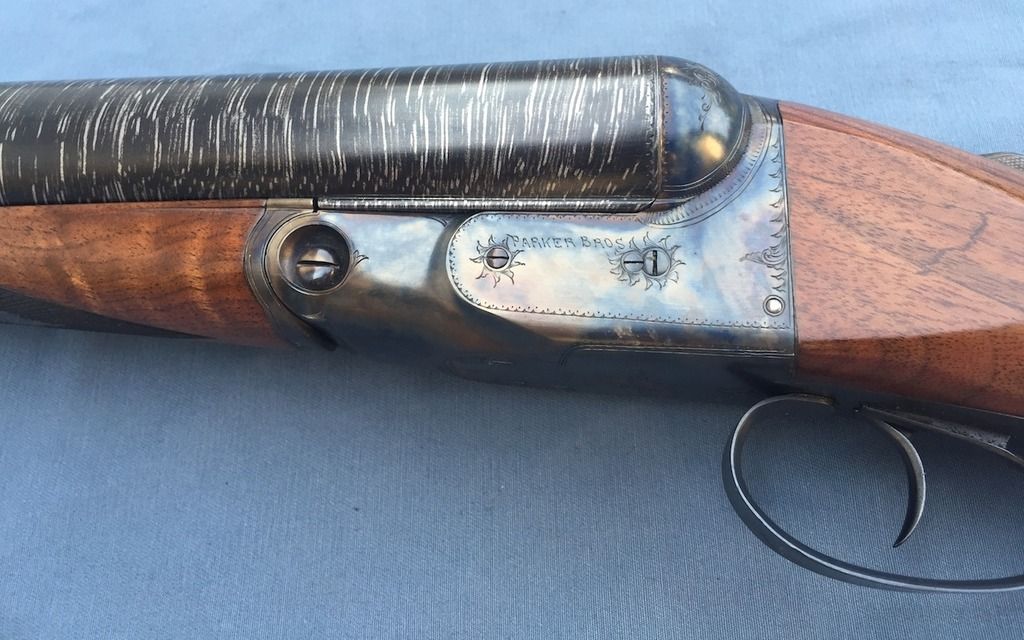 Parker Repro A1 Custom. 12g.  Another Parker Repro A1 Custom. 20g. 
B.Dudley
|
|
|
|
|
Joined: Jan 2002
Posts: 14,198 Likes: 1983
Sidelock
|

Sidelock
Joined: Jan 2002
Posts: 14,198 Likes: 1983 |
I'm not sure that all color deteriorates over time. I guess that some forms of protection, other than a lacquer covering, prevents most fading. I'm not either, Bill, and I am even more skeptical that light causes "case colors" to deteriorate or fade. My reasoning is that, due to microscopic evaluations of case hardened surfaces (iron oxides) it was learned many years ago that the colors themselves are only reflections of light from tiny iron oxide globules that are formed on the surface during the process. As Oscar put it, quote, "The predominant effect of the globules is probably their acting as miniature lenses and prisms which diffuse the reflected light in all directions, and the color is determined primarily by the thin continuous oxide film on the surface of the steel." So, my reasoning is that if indeed the colors are due to a physical property, i.e. the configurations of the surface of the steel, how can light change those configurations? I cannot see how it is possible. I have considered the damage caused to many compounds by ultraviolet light, something that is real and quantifiable, but I cannot see how UV could change the physical properties of the surface of steel. Now, I can accept that oxygen plus humidity could do so, even wear from handling or cleaning, but light itself? Nah. Howevah', I am open to reason, and know that there may be things I have not considered. SRH
May God bless America and those who defend her.
|
|
|
|
|
Joined: Oct 2006
Posts: 879
Sidelock
|

Sidelock
Joined: Oct 2006
Posts: 879 |
Can light change things? Sure as heck I'm not an authority on most things, but I understand that suntan lotions work by absorbing sun rays, and render the rays harmless by using the rays to change the chemistry of the lotion. Does this happen with other things? I dunno
|
|
|
|
|
Joined: Jun 2006
Posts: 3,309 Likes: 457
Sidelock
|

Sidelock
Joined: Jun 2006
Posts: 3,309 Likes: 457 |
I hate this response already.
It's like arguing with a deceased saint over what was meant when he transcribed the scriptures.
Prepare to head on down the rabbit hole.
The science of those globules, how they stick together, and how they come apart is called "Group Theory".
It's Algebra nerd nirvana. It's the science of poly chrystalline structures. And I haven't prepared a meaningful lecture on it in 30 years.
But for the purposes of case colors, we can say that the globules lay on each other in layers. They are connected to each other in various ways into all sorts of glorious shapes by electron and mechanical bonds. Kind of like a stack of crab pots or little lion cages. A little of this, and a little of that, changes their shape, and the color they resonate at. Some atoms are way bigger than others, so if they are held in the little chrystal cage, they bulge the sides. Or bend the electron frame a little. That might make that little cage stronger or weaker.
Equally importantly, we can tighten, vibrate, or break those bonds'little cages with the addition of energy. It doesn't matter what kind of energy is applied. We might be most familiar with basic friction from a dirty rag rubbed across the film. Or Ed's blow torch. Or a microwave oven.
Energy added, and some of the bonds get broken, because sometimes the Lion wants out (big encaged atom). It can just as easily be light energy. Excite the atoms, the most responsive bonds break, and the chrystal structure reflecting back that wavelength of light, no longer does so. It's now a different color .
How does 80 degree sunshine blister our skin? Absorption of energy. Same deal.
When steel is heated to a high temperature, the addition of the heat energy is creating chrystal structures that would never occur at a lower temp. But at quench, we can freeze them where they are.
And our world benefits from that every day.
Case colors, micro, even nano thick films, are still chrystalline structures, and all the rules of their assembly, disassembly, and rearrangement apply to them.
We can cleave them. crush them, , oxidize them, dissolve them, any energy based transformation.
Oxygen atoms will do it one chrystal at a time, so we work to keep O2 away from our valuable oxides.
Chrystal chemistry is true nerddom run amok. I don't do the true scientists justice with my feeble explanations.
But the addition of energy, from whatever source, can excite polychrystalline compounds enough to break bonds, and try to become something else that is more stable, however slowly it happens. The lion always wants out of the cage.
I'd like to think there's a PhD Inorganic Chemist hereabout's to tell me I'm full of crap.
I want common ground with Dr. Gaddy, so, I'm amenable to saying that the desire of Iron to break out of it's cage and partner with more Oxygen atoms, is most quickly accomplished with the direct application of lots of energy. Like with a dirty rag.
Out there doing it best I can.
|
|
|
|
|
Joined: Mar 2013
Posts: 2,862
Sidelock
|

Sidelock
Joined: Mar 2013
Posts: 2,862 |
Here's the very extensive CC thread of a few years ago. Sadly, a few of the participants no longer post or are no longer with us. http://www.doublegunshop.com/forums/ubbthreads.php?ubb=showflat&Number=326247&page=allCZ, that was amazingly understandable. Thanks.
Last edited by Ken61; 11/03/16 08:57 PM.
I prefer wood to plastic, leather to nylon, waxed cotton to Gore-Tex, and split bamboo to graphite.
|
|
|
|
|
Joined: Jun 2006
Posts: 3,309 Likes: 457
Sidelock
|

Sidelock
Joined: Jun 2006
Posts: 3,309 Likes: 457 |
I'm surprised at how consistent I've remained on this subject. And also, there's theory, and practice. I want all practitioners to understand what they are doing, so they can do what their mind conceives. I want everyone to put X color right where they want it, in the pattern they desire. I'm pretty sure you can manipulate your pack's impurities to put different lions in different cages. Same with quench water Shhhhhhsh. Everyone says. 
Out there doing it best I can.
|
|
|
|
|
Joined: Jan 2002
Posts: 14,198 Likes: 1983
Sidelock
|

Sidelock
Joined: Jan 2002
Posts: 14,198 Likes: 1983 |
Well written, CZ. Thank you for that understandable explanation. I am now somewhat accepting that there may be a way for light, for long enough periods, to change that structure. What I would like a bit more understanding of, if possible, concerns what you explained about the energy from light, or other sources, changing the shape of the iron globules that actually reflect (or refract?) the light into the colors we see. You explained that the changes in their structure cause them to reflect a different wavelength of light, thus we see a different color than previously. If that is the case, why does it always fade into a lighter, paler shade of that same color, and not just change colors completely? No colors on a case-hardened gun actually change into another color, they just slowly fade away from abrasions, however slight they may be (but cumulative), until they are no more.
You have piqued my interest and curiosity, and I want to understand more about this. I have a heat treating, thermostatically controlled oven, wood and bone charcoal, a crucible and means to handle it at temperature, but have yet to take the plunge, pardon the pun. Still trying to garner more information that might help me gain some level of control over the results.
Thanks, SRH
May God bless America and those who defend her.
|
|
|
|
|
Joined: Oct 2009
Posts: 6,717 Likes: 642
Sidelock
|

Sidelock
Joined: Oct 2009
Posts: 6,717 Likes: 642 |
Great explanation CZ. Very understandable. Hope it's correct! LOL Did you look at your 30 year old notes?
The world cries out for such: he is needed & needed badly- the man who can carry a message to Garcia
|
|
|
|
|